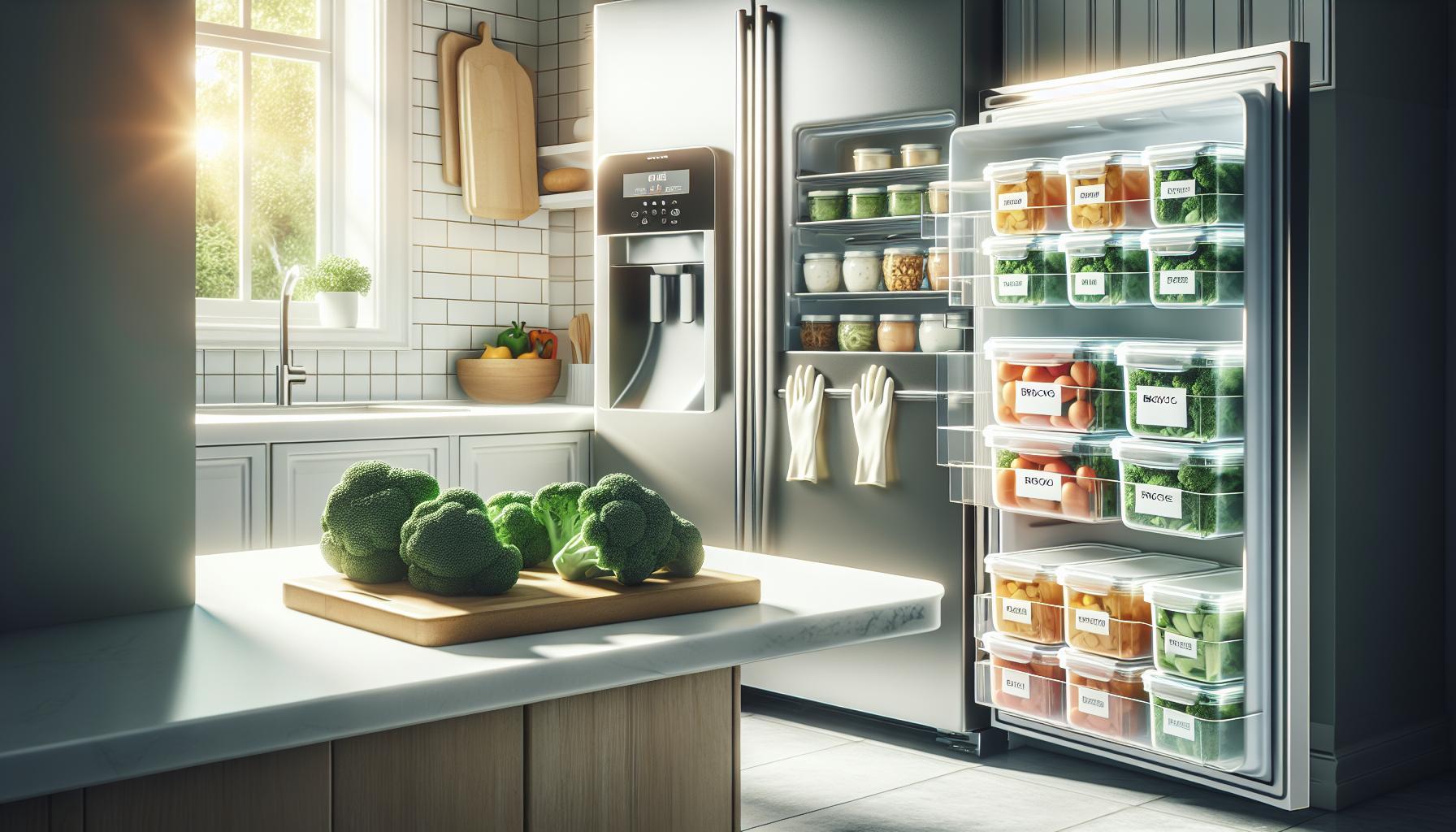Did you know that properly stored fresh farm eggs can stay safe and delicious for several weeks? Understanding how long these eggs last in your fridge is essential for ensuring food safety and minimizing waste. Whether you purchase them directly from local farms or enjoy the perks of backyard chickens, knowing the lifespan of your fresh eggs can help you make informed meal planning choices.
Fresh farm eggs are not only a nutritional powerhouse but also a versatile ingredient in countless recipes. However, lingering concerns about freshness can lead to unnecessary disposal. In this article, we’ll explore the science behind egg longevity, provide practical storage tips, and share the best practices for keeping your eggs at their peak quality. Uncover the secrets to maximizing the lifespan of your farm-fresh eggs and enjoy their benefits longer!
How Fresh Farm Eggs Are Different from Store-Bought Eggs
Fresh farm eggs offer a delightful sensory experience that starkly contrasts with store-bought varieties. One prominent difference is their vivid yolk color, which can range from deep orange to a lighter yellow, indicative of the hens’ diets-typically richer in fresh greens and grains. This not only enhances the visual appeal of dishes but is also a sign of higher nutrient levels; farmers who raise their hens free-range often report eggs that brim with flavor. Additionally, the freshness of farm eggs can be tasted in cooking and baking, creating a distinct quality that many chefs and home cooks prize.
In terms of freshness, farm-fresh eggs are typically gathered daily, ensuring that the consumer receives them at their peak quality. In contrast, store-bought eggs can sit on shelves for weeks before purchase, leading to a decline in taste and nutritional value. To gauge freshness, performing a simple water test can be helpful: fresh eggs sink in water, while older ones float due to the enlarging air cell within. This practical method empowers users to discern their eggs’ viability before cooking.
Storage Practices for Fresh Farm Eggs
Proper storage is key to maximizing the longevity of fresh farm eggs. It’s best to keep them in the refrigerator to maintain their quality and safety. Ideally, store them in a dedicated egg compartment or a container to protect them from absorbing other odors and to prevent cracks from accidental impact. When placed in the fridge, fresh farm eggs can last 3-5 weeks, provided they are kept at a steady temperature of around 40°F (4°C).
By understanding these unique characteristics and best practices, consumers can truly appreciate the superior quality of fresh farm eggs compared to their store-bought counterparts.
Best Practices for Storing Fresh Farm Eggs

Properly storing fresh farm eggs is essential to ensure their longevity and safety while maximizing their delightful taste and nutritional benefits. Did you know that eggs can last in the fridge for 3-5 weeks if stored correctly? To achieve this, start by keeping your eggs in their original carton. The carton not only protects the eggs from absorbing strong odors from other foods, but it also helps to reduce moisture loss. When eggs are kept in their carton, the enclosed air space helps maintain freshness and quality.
Keeping your refrigerator at an optimal temperature is crucial for egg preservation. Fresh eggs should be stored at a steady temperature of approximately 40°F (4°C). Fluctuations in temperature can compromise their safety and freshness. For best results, place eggs in the middle or back of the refrigerator rather than in the door, where temperatures can fluctuate more significantly due to frequent openings.
It’s advisable to perform a freshness check periodically. One simple method is the water test: fill a bowl with water and gently place the egg in it. Fresh eggs will sink and lay flat on the bottom, while older eggs will stand upright or float, indicating they should be discarded. This straightforward method provides an easy way to evaluate egg viability before cooking.
If you have purchased eggs that are close to their expiration date or have leftover cooked dishes containing eggs, consider freezing them for long-term storage. Whole eggs should be beaten and poured into an ice cube tray before being frozen. This allows for easy portioning later and can extend their usability significantly. Remember to label your freezer bags with the date for tracking. By following these best practices, you’ll enjoy the exceptional quality of fresh farm eggs while ensuring their safety and longevity in your kitchen.
How Long Do Fresh Farm Eggs Last in the Fridge?

Fresh farm eggs, celebrated for their rich flavor and superior quality, have an impressive shelf life when stored correctly in your refrigerator. Generally, these eggs can remain safe to consume for 3 to 5 weeks. To ensure they maintain their freshness and nutritional benefits, it’s important to follow proper storage practices.
When placing fresh farm eggs in the fridge, keeping them in their original carton is essential. The carton not only serves as a protective casing but also minimizes moisture loss and prevents the eggs from absorbing odors from other foods. It’s advisable to store the eggs in the middle or back of the refrigerator rather than in the door, where temperature fluctuations can occur due to frequent openings.
To assess the longevity of your eggs, performing a simple freshness test can be incredibly helpful. One effective method is the water test: gently place an egg in a bowl of water. Fresh eggs will sink and lay flat on the bottom, while older eggs may stand upright or float. Floating eggs should be discarded, signaling that they may be no longer safe for consumption.
To maximize their usability, always check the expiration date on the carton and practice good hygiene when handling eggs. If you find yourself with eggs approaching their sell-by date, consider cooking or freezing them to extend their shelf life. By following these guidelines, you can not only enjoy the taste of fresh farm eggs but also feel confident in their safety and quality while stored in your fridge.
Signs That Fresh Eggs Have Gone Bad
If you’ve ever cracked open an egg only to be greeted with an off-putting smell or unusual appearance, you know how crucial it is to identify when eggs have gone bad. Fresh farm eggs can last well in the fridge, but their quality can diminish over time. Understanding the signs that indicate spoilage can help you maintain kitchen safety and ensure your culinary creations are both delicious and safe.
One of the most telling indicators of a spoiled egg is its odor. Fresh eggs typically have little to no smell. However, if you crack an egg open and detect a strong, sulfurous odor, it’s best to discard it immediately-this aroma is a clear sign of spoilage. Additionally, visual cues can be just as important. Fresh eggs have a vibrant yolk and a clear egg white. If the egg white appears cloudy or watery, or if the yolk is flattened instead of rounded, these changes may indicate age and potential spoilage.
Another simple, effective method to check egg freshness is the water test. Place the egg in a bowl of water: fresh eggs will sink and lay flat on the bottom, while older eggs may stand upright on the bottom or even float to the surface. Floating eggs are a sign that they have gone bad and should be discarded.
In terms of timeframes, while fresh farm eggs can last 3 to 5 weeks in the fridge, it’s crucial to trust your senses and perform periodic checks. Always maintain best practices by storing eggs properly and being vigilant about their condition. By staying attentive to these signs, you can confidently enjoy the rich flavors of fresh farm eggs without compromising on safety.
The Science Behind Egg Freshness and Safety
Egg freshness is a fascinating topic grounded in science, as various factors affect how long your eggs will stay safe and delicious. At the heart of egg freshness is the air cell that forms within the egg as it ages. As the egg cools after laying, the moisture inside begins to evaporate, causing the air cell to grow larger. This change can impact the egg’s buoyancy; consistently using methods like the water test can be an effective way to gauge this.
Protective membranes inside the eggshell, along with the natural coating (bloom), help keep bacteria at bay. When eggs are washed, this protective barrier can be compromised, increasing the likelihood of bacteria penetrating the shell. Therefore, while washing might leave an egg looking cleaner, it can actually reduce its lifespan and safety. For those who decide to wash their eggs, doing so immediately before use rather than in advance is advisable, as this minimizes the time the egg is exposed to potential contaminants.
A vital aspect of egg storage is temperature. Keeping eggs refrigerated at temperatures below 40°F (4°C) is crucial for maintaining their quality and preventing the growth of pathogens like Salmonella. Under such controlled conditions, fresh farm eggs can generally last for three to five weeks, but notable are ways to extend their usability safely. Adhering to best practices-like storing eggs in their original carton to minimize exposure to light and other odors-directly contributes to their longevity.
In regards to food safety, understanding the science behind egg storage helps reduce risk while maintaining quality. You can confidently store fresh eggs and enjoy their rich flavors by employing these science-backed practices. By remaining aware of how factors like time and temperature affect freshness, you’re better equipped for a safe and delicious culinary experience.
Optimal Refrigerator Temperature for Egg Storage
Maintaining the optimal temperature for egg storage is essential in prolonging the freshness and safety of your farm-fresh eggs. Eggs are perishable and can quickly degrade if not stored under proper conditions. Keeping the refrigerator temperature consistently below 40°F (4°C) is critical; this environment inhibits the growth of harmful bacteria, such as Salmonella, ensuring that your eggs remain safe and delicious for a longer period.
In practice, it’s crucial to utilize the coldest part of your refrigerator rather than the door, which often experiences fluctuations in temperature due to frequent opening and closing. The middle shelves are usually a safe bet, as this area tends to maintain a more stable temperature. Moreover, store eggs in their original carton-this not only protects them from absorbing strong odors from other foods but also helps shield them from light, which can significantly affect their shelf life.
Best Practices for Refrigerating Eggs:
- Keep your refrigerator’s temperature below 40°F (4°C).
- Avoid storing eggs in the door; choose the middle shelves instead.
- Keep eggs in their original carton for protection and odor prevention.
When stored correctly, fresh farm eggs can last between 3 to 5 weeks in the refrigerator, depending on their initial freshness and handling. However, regular checks for quality and freshness can help maximize their culinary potential. A simple water test can serve as a quick assessment: fresh eggs will sink and lay flat on the bottom, while older eggs will stand upright or float, indicating that it may be time to discard them. By observing these practices, you can ensure that your eggs remain in their prime, allowing you to enjoy their rich flavors and nutritional benefits safely.
Do Fresh Farm Eggs Need Washing?
Fresh farm eggs often arrive from the coop with a bit of dirt or debris, leading many to wonder whether washing them is necessary. Surprisingly, the answer usually depends on how you plan to store and use these eggs. Eggs come with a natural protective coating, known as the bloom or cuticle, which helps to keep bacteria at bay and maintain freshness. Washing can remove this protective barrier, making the eggs more susceptible to contamination if not dried and stored properly.
If you choose to wash your eggs, it is crucial to do so in a way that minimizes potential risk. Use warm water-not cold-since this will help to open the pores of the shell and avoid suction that can draw bacteria inside. Keep in mind that any washing should be done just before you plan to use the eggs rather than before storing them. For optimal safety, if the eggs are particularly soiled, a gentle scrub with a brush can be effective without compromising the bloom. After washing, dry the eggs with a clean, dry cloth before refrigerating.
For those who prefer convenience and longevity, leaving the eggs unwashed until use is generally recommended. This approach allows the natural protections to do their job, ensuring the eggs remain viable for the longest time. Proper storage is also crucial; as mentioned earlier, place your unwashed eggs in their original carton on the middle shelf of the refrigerator where temperatures are stable. This method can prolong freshness significantly, allowing farm-fresh eggs to last up to 5 weeks in the fridge without washing.
By understanding the implications of washing eggs and adhering to safe handling practices, you can enjoy the rich flavors and nutritional benefits of fresh farm eggs while minimizing health risks.
The Role of Date Labels on Egg Quality
Date labels on eggs can significantly influence your understanding of their freshness and safety. These labels often take the form of “sell by,” “use by,” or “best before” dates, and while they provide a guideline, the reality of egg longevity is both practical and scientific. Understanding these labels helps you make more informed decisions regarding your egg consumption and storage practices.
Research shows that fresh farm eggs, when stored properly, can remain safe and tasty for several weeks, even past their labeled dates. For instance, a sell-by date typically indicates the last day on which the grocery store should sell the eggs, not necessarily when they go bad. If you purchase eggs that are just a few days before the sell-by date, it’s common for those eggs to still maintain their freshness for up to 3-5 weeks when refrigerated properly. To ensure maximum freshness, always opt for eggs from trusted sources that adhere to good farming practices.
To aid in your egg selection and maximize their shelf life, consider the following tips regarding date labels:
- Sell by: This date is meant for retailers to manage inventory. Eggs can still be good for 3-5 weeks past this date if stored correctly.
- Use by: Indicates when the eggs should ideally be consumed for the best quality. It does not mean they are unsafe after this date; however, quality may decline.
- Best before: Similar to “use by,” this date gives a good indicator of quality. Eggs can still be fine a few weeks beyond this label, depending on storage methods.
When determining whether an egg is still good to eat, perform the water test. Fill a bowl with water and gently place the egg in it. Fresh eggs will sink and lay flat, while older eggs will either stand upright on the bottom or float, indicating they may be past their prime. This simple test, combined with awareness of date labels, will empower you to enjoy farm-fresh eggs safely and effectively.
Exploring Shelf Life: Raw vs. Cooked Eggs
The longevity of eggs, whether raw or cooked, is an essential consideration for any household. Fresh farm eggs can be stored safely in the refrigerator for several weeks, while the shelf life of cooked eggs differs significantly. Understanding the distinctions between raw and prepared eggs can help you maximize your food quality and safety.
When it comes to raw eggs, properly refrigerated fresh farm eggs can last up to 3-5 weeks past their sell-by date, provided they are stored at a consistent temperature below 40°F (4°C). It’s important to keep them in their original carton, as this prevents moisture loss and minimizes the absorption of odors from other foods in the fridge. To maintain freshness, always check the eggs for signs of spoilage before use, such as unusual odors or changes in texture during preparation.
In contrast, cooked eggs have a shorter shelf life. Once cooked, eggs should generally be consumed within 3-4 days if stored in the refrigerator. This timeline applies to various preparations, including boiled, scrambled, or baked eggs. It’s crucial to cool cooked eggs promptly after cooking and store them in airtight containers to inhibit bacterial growth and retain quality. If you find yourself with leftovers that you cannot consume within this timeframe, consider freezing cooked eggs, which can last for up to a year in the freezer when properly sealed.
To help visualize the differences in shelf life, consider the following summary:
| Type of Egg | Storage Time (Refrigerated) |
|---|---|
| Raw Fresh Farm Eggs | 3-5 weeks past sell-by date |
| Cooked Eggs | 3-4 days |
By understanding these storage guidelines, you can effectively manage your egg consumption and reduce food waste while ensuring that your family enjoys the best possible quality and safety in their meals.
Creative Ways to Use Outdated Eggs
Even as eggs approach their expiration date, they can still hold great potential for culinary creativity. Instead of discarding those last few outdated farm-fresh eggs, consider incorporating them into delicious dishes or DIY projects that make the most of their remaining freshness. Eggs can be remarkably versatile, and knowing how to use them creatively can help reduce waste while delighting your taste buds.
One of the simplest and most satisfying ways to use slightly outdated eggs is by making a frittata or a quiche. Both dishes are highly adaptable, allowing you to incorporate leftover vegetables, cheeses, and meats that you may have on hand. Simply whisk the eggs together, mix in your ingredients, and bake until set. Frittatas are delightful hot or cold, making them a perfect option for breakfast, lunch, or dinner.
Another great use for aging eggs is baking. Whether whipping up a batch of decadent cookies, a rich cake, or a flavorful custard, eggs play a crucial role in adding structure and moisture. If you’re concerned about the age of the eggs, opt for recipes that use them in cooked forms, where any potential bacteria are eliminated through the cooking process. Just ensure that you check for any signs of spoilage before use, such as off-putting odors or unusual appearances.
Furthermore, you can approach the realm of homemade pasta with those outdated eggs. Making fresh pasta not only elevates dishes but also maximizes the use of them. Combine eggs with flour to create a simple yet satisfying dough, rolling it out and cutting it into your favorite shape. You’ll end up with a delightful homemade meal that makes for a warm and comforting dish.
For those looking to make their outdated eggs more enjoyable, may you consider crafting a rich eggnog or infused mayonnaise. These preparations provide a smooth consistency and are perfect for holiday gatherings or as a flavorful sandwich spread. Be sure to keep the safety measures in mind: egg-based dishes should be kept refrigerated and consumed within a sensible timeframe to ensure the best quality and safety.
By thinking outside the box and utilizing delicately aged eggs in creative recipes, you can continue to enjoy their benefits while minimizing food waste. Always prioritize safety by conducting a quick freshness test: fill a bowl with water and gently place the eggs inside; fresh eggs will sink, while older eggs will float. As you embark on these culinary adventures, you’ll find that even aging eggs can bring warmth and satisfaction to your meals.
Tips for Preserving Eggs for Long-Term Storage
To extend the life of your farm-fresh eggs and maintain their delicious quality, employing proper preservation techniques is essential. Fresh eggs that have been collected and stored correctly can last several weeks up to several months, depending on the method of preservation. One of the most effective ways to store fresh eggs is to utilize refrigeration to slow spoilage. Ideally, farm-fresh eggs should be kept in the refrigerator, where they can last for three to five weeks past the pack date. However, if you want to store them for more extended periods, consider the following methods.
Cold Water Glassing
This traditional method involves immersing eggs in a solution that helps to seal their pores and protect them from bacteria. Begin with clean, unwashed eggs still retaining their natural protective coating. In a clean container, mix one part food-grade slaked lime (calcium hydroxide) with nine parts water. Place the eggs in this mixture, ensuring they’re fully submerged. When stored in a cool, dark place, glassed eggs can remain usable for up to a year! Regularly check for any signs of spoilage, but if done correctly, this method can effectively prolong the shelf life of your farm-fresh eggs.
Freezing Eggs
Freezing is another excellent option for preserving eggs long term. To freeze eggs, crack them into a bowl and whisk until blended. You can freeze them in individual sections using ice cube trays for easy portioning or use freezer-safe containers. It’s advisable to freeze separately – whites and yolks – instead of whole eggs to prevent texture changes. When frozen properly, eggs can last up to one year. Just remember to label your containers with dates for accurate tracking and use them within six months for optimal quality.
Pickling Eggs
Another creative method for preservation is pickling. Hard-boil your eggs, peel them, and then submerge them in a mixture of vinegar, water, and your choice of seasonings. Allow them to steep for at least a week; this not only preserves the eggs but also enhances their flavor. Pickled eggs can be enjoyed as a tangy snack or salad topping and can be stored for several months in the refrigerator when sealed correctly.
By implementing these preservation techniques, you can enjoy farm-fresh eggs well beyond their typical refrigerator life. Keep in mind the importance of cleanliness and regular inspections to ensure safety, and always prioritize using the freshest methods available. As you explore long-term storage options, you can confidently reduce waste while savoring the farm-fresh flavors throughout the year.
Frequently asked questions
Q: How can I tell if fresh farm eggs are still good to eat?
A: Fresh farm eggs can be tested for freshness using a water test. Fill a bowl with water and gently place the egg in it. If the egg sinks and lays flat, it’s fresh. If it stands upright or floats, it should be discarded.
Q: What is the best way to store fresh farm eggs in the fridge?
A: To store fresh farm eggs, keep them in their original carton in the main compartment of the refrigerator. This helps maintain moisture and protects them from absorbing odors. Avoid washing the eggs until you’re ready to use them, as moisture can promote bacterial growth.
Q: Can I freeze fresh farm eggs for later use?
A: Yes, you can freeze fresh farm eggs. Crack them open and beat the yolks and whites together, then pour the mixture into an airtight container. They can be stored in the freezer for up to a year. When you’re ready to use them, thaw in the refrigerator.
Q: How long are eggs good after their sell-by date?
A: Eggs can often be safe to eat for 3-5 weeks past the sell-by date if stored properly in the fridge. Always check for signs of spoilage before use, such as an off smell or strange appearance.
Q: Are farm-fresh eggs healthier than store-bought eggs?
A: Farm-fresh eggs are often considered healthier since they tend to be fresher and may contain more nutrients, such as omega-3 fatty acids. Their diet can differ from commercially raised hens, potentially affecting the nutritional profile.
Q: What temperature should I store fresh farm eggs at in the fridge?
A: Fresh farm eggs should be stored at a temperature of 35°F to 40°F (1.7°C to 4.4°C) in the refrigerator. This helps maintain their freshness and safety for consumption.
Q: Is it necessary to wash fresh farm eggs before using them?
A: It is not necessary to wash fresh farm eggs before using them, as washing can remove the natural protective coating. If eggs are visibly dirty, rinse them gently under warm water just before using.
Q: How can I extend the shelf life of fresh farm eggs?
A: To extend the shelf life of fresh farm eggs, store them in their original carton in a cool, consistent temperature environment, and avoid washing them until just before use. For long-term preservation, consider freezing them.
In Summary
Understanding how long fresh farm eggs last in the fridge is crucial for enjoying their freshness and maintaining food safety. Typically, these eggs can stay fresh for 3 to 5 weeks, especially when stored properly. If you’re looking to extend their lifespan further, consider keeping them in their original carton to protect them from odors and damage. Don’t hesitate to check our guides on food safety practices and optimal storage techniques to empower your kitchen skills.
If you found this information helpful, explore our related articles on “Egg Storage Tips” and “How to Tell if Eggs are Still Good” for more valuable insights. Join our newsletter for the latest tips and tricks, ensuring you always have the best information at your fingertips. Remember, proper egg storage not only enhances your meals but also contributes to safer eating-take action today to make sure your kitchen is as efficient as possible! Feel free to share your thoughts or questions in the comments below; your engagement helps us create even more informative content!





